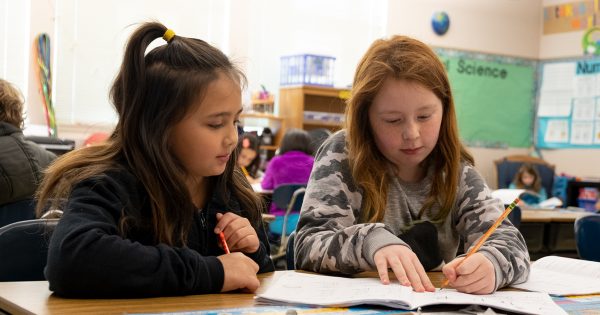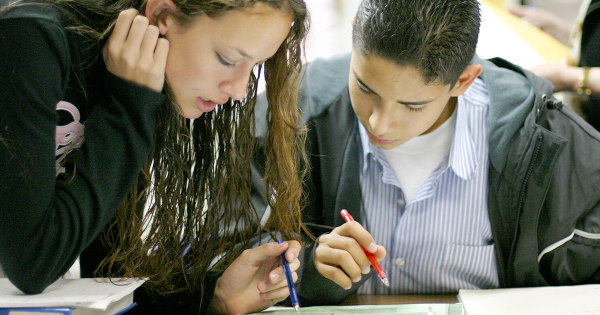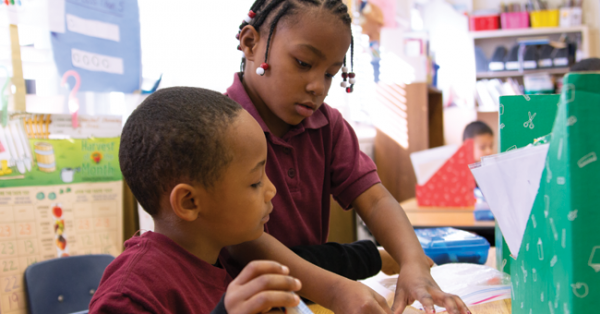Build a student-centered culture of learning to improve equitable outcomes
Formative Insights in action
Discover stories from our partners working to integrate formative assessment into everyday teaching and scale positive outcomes across all levels of educational systems.
Click to explore emerging knowledge and collaborative approaches by role to formative assessment.
“Our students are engaged on a whole different level because when they can speak to success criteria…their exchange is so different. They have exchanges referencing the work, and the thinking process.”
“Through the work of the formative assessment class, teachers have shifted that focus to ‘what are my students going to learn, not what am I teaching today?’ [This means] really looking at what do students need to learn and how are they going to learn it?”
“I think this broader understanding of formative assessment [as] a continuous process of identifying learning gaps and teachers and students working together to close those gaps is what’s so powerful [about this approach].”
“For me, student agency is really about showing the kids and believing that the kids can do things on their own, that they can take control of their learning and be successful with it.”
“I feel that my role as an assistant superintendent for instruction is to support teachers and school leaders by physically being involved, knowing what it means and being able to help them spread formative assessment through.”
“I think before, I thought I was arranging student ownership in the learning, but now that I’m allowing them to take full ownership, they sit down and together we decide exactly what it means to be successful. That ownership is what’s pushing them so much further.”
“When I walk into a classroom and see students that are empowered to own their own learning, students are able to take their learning goals and [can] tell the teacher ‘what will it mean if I’m successful today?’ and then reflect on their work to see [if] they’ve met those goals.”
“I co-construct the success criteria with [students] because it gives them an ownership of what they’re responsible for…and a better understanding of what they need to make sure they include in their writing. I do get excited about [formative assessment] because it truly does work.”
“It’s our job at the district level and school-based administration level to spread [awareness] of what [formative assessment] really is and why it’s good for kids.”
“When [students] came to me at the beginning of the year with their writing, it was ‘what do you think I’m good at?’ And now it’s become a conversation and that’s really what I love about teaching…I want you to figure out what it is that you’re good at.”
“In doing this work with students, my hope is that their identities as learners will continue to flourish and that they will continue to see themselves as readers, scientists, writers, mathematicians, and that they take on these roles and acknowledge their strengths as well as their weaknesses.”
“You don’t do formative assessment on Tuesday morning … Formative assessment is five days a week, you know, every single lesson … it becomes second nature to you.”
“If I want this learning target to be accomplished, what else matters? And then build parameters from there.”
“When we talk about learning culture in a classroom, we are talking about the conversations, the discourse that’s happening between students and the focus of all of their interactions are around academics.”
“He checked on the writing checklist, cause the writing checklist has the punctuation on it. So he looked there, maybe, and he did that.”
“I think the experience of a family, we’re able to correct each other without making fun of them…I I have a question I can ask Gian without feeling like he’s judging me, he’s wanting to help me.”
“[It’s better to] receive feedback because I know what to change for the next time I do that activity.”
“[Your peers] give you specific feedback and they also can help you with your learning.”
Amplify student agency and identity
Learn more about our professional learning and technical assistance services. We offer a variety of in-person and online formats tailored to meet the specific needs of your school or district.
Learning resources to engage and inspire
Find resources organized by role to showcase relevant ideas and concepts essential to scaling formative assessment.




